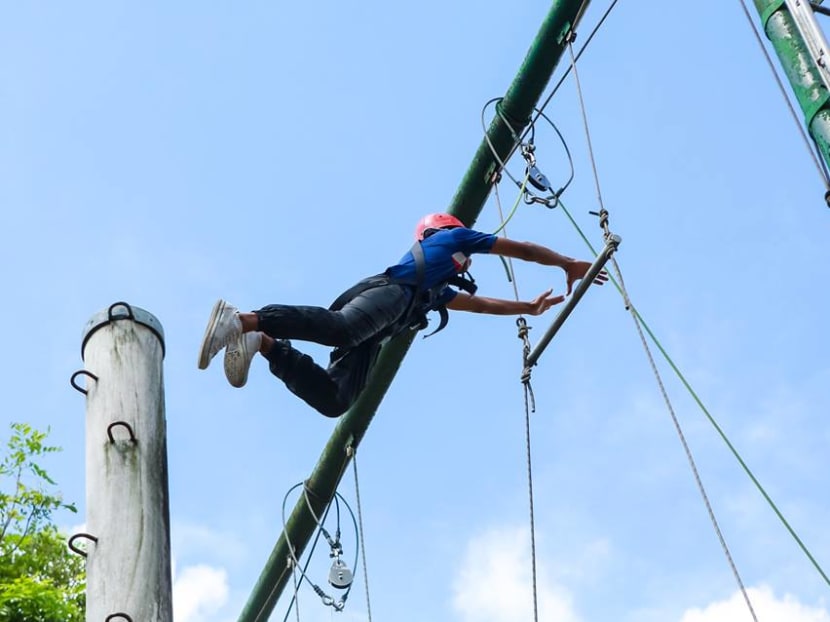Schools to foster love of learning, reduce focus on exam results: MOE
SINGAPORE — The Ministry of Education (MOE) will continue its mission to reduce excessive focus on academic results in a bid to make learning more enjoyable, where examinations are “not overly perceived to be high-stake endeavours”.
SINGAPORE — The Ministry of Education (MOE) will continue its mission to reduce excessive focus on academic results in a bid to make learning more enjoyable, where examinations are “not overly perceived to be high-stake endeavours”.
Students will have “more time and space to pursue a broader range of interests, sustain their curiosity, cultivate an innovative spirit and pursue a well-rounded education”, the ministry added in its addendum to President Tony Tan’s address on Friday to open the 13th Parliament.
The MOE’s response was among the four issued today (Jan 19) that addressed the President’s message on renewing the economy. The other three addenda were issued by the Ministry of Manpower, Ministry of Trade and Industry, and the Monetary Authority of Singapore in the Prime Minister’s Office.
Starting at the primary-school level, the MOE will be looking at placing a stronger emphasis on outdoor education to build up ruggedness and resilience in students. Programmes will also be strengthened to help students discover their strengths and interests in areas such as arts, music and sports.
Tampines Primary School, for example, has a Learning for Life Programme in drama for learning and character development. Principal Veronica Tay said drama is used to make learning more interesting, such as using drama to act out science concepts.
“We explore ways to engage the children and enthuse them to learn and develop their knowledge, skills and values. We see that children have different capabilities and abilities, and … somehow they can pick up better and visualise better when teachers engage them in different ways,” said Ms Tay, adding that drama also helps students discover their hidden talents.
To gradually expose students to the outdoors as they get older, Ms Tay said the school will be considering ways to improve its outdoor education by expanding activities to include visiting nature trails and outings to Pulau Ubin.
Secondary students will also have more options to develop their interests, with schools to offer distinctive programmes and applied learning opportunities. Junior college graduates will be better prepared for further learning with the strengthening of 21st century competencies in the curriculum.
“At every stage of their education journey, we will create an environment conducive for holistic development, by providing them the time, space and opportunity to discover and nurture their talents, strengthen their character, and develop their lifelong love for learning,” said Acting Minister for Education (Schools) Ng Chee Meng.
The MOE will also continue to develop multiple pathways spanning diverse fields, from science and technology to social services, at the tertiary levels. Universities are expanding their offerings beyond the traditional fields, with the Singapore Institute of Technology and SIM University set to launch more applied degree programmes.
While the Institute of Technical Education and polytechnics will be placing greater emphasis on industry attachments, the MOE said selection practices at institutes of higher learning will be more holistic and assess students beyond their academic scores.
Initiatives to support lifelong learning through SkillsFuture will also be overseen by the MOE, such as enhancements to the Education and Career Guidance initiative and a wider range of skills-based modular courses at post-secondary education institutions.
“From a strong academic foundation, we aim to help Singaporeans discover their strengths and interests, develop their potential, cultivate passions, and fulfil aspirations. We want to support Singaporeans to continually develop and deepen their skills throughout their lives,” said Acting Minister for Education (Higher Education and Skills) Ong Ye Kung.
“Ultimately, we hope for a Singapore where every individual is able to contribute actively, and is valued and respected for his or her skills and knowledge, across diverse fields.”
MAKING LEARNING FUN
Develop strengths and interests of every child
- Provide wider exposure and opportunities for students to discover and build on their interests and talents
- Continue efforts to reduce excessive focus on academic results
- In the pre-school sector, continue to develop, refine and share quality kindergarten curriculum, age-appropriate teaching and resources
- Strengthen programmes in primary schools to help students discover their strengths and interests in areas such as arts, music and sports; stronger emphasis on outdoor education to build up ruggedness and resilience
- Have secondary schools with distinctive programmes in various domains to provide more options for students
- Better prepare junior college graduates for further learning
Develop an inclusive system
- Strengthen school-based levelling-up programmes to support academically weaker students
- Provide financial support to students from financially challenged families
- Expand Student Care Centres
- Support children with special educational needs through school-based programmes, specialised services, special education schools, and programmes to smoothen transition from school to work
- Strengthen teacher training and ongoing professional development
Establish multiple pathways for diverse aspirations
- Develop multiple pathways, spanning diverse fields from science and technology to social services, creative arts and hospitality, at the post-secondary and tertiary levels
- Focus on learning not just in school but also in the workplace, with greater emphasis on industry attachments and SkillsFuture Earn and Learn Programme
- Increase cohort participation rates for publicly funded university places from 32 per cent to 40 per cent by 2020
- Ensure strong regulation for the private education space
- Enable better matching of interest and course of study
- Institutes of higher learning to expand the use of selection practices that assess students based on attributes beyond academic scores
- Increase number of part-time programmes and skills-based modular courses at post-secondary education institutions










